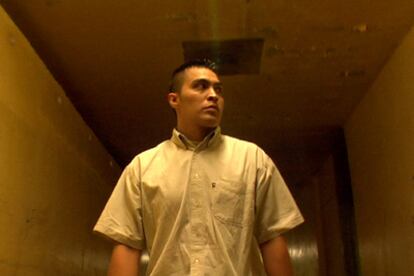Censored for showing up legal system
Mexican judge prohibits screening of attorneys' documentary 'Presumed guilty'
By Thursday of last week, some 430,000 people had seen Presumed guilty, a documentary that relates the story of a young man, José Antonio Zúñiga, who was jailed for a murder he didn't commit. They may well be the last. On Friday all 200 copies were due to be withdrawn from theaters, pending the outcome of a legal challenge, which some have already described as censorship. On Thursday night the ruling had yet to reach cinemas and the film was still on the bill.
The documentary premiered in Mexico on February 18, with over a dozen prizes from international festivals under its belt. With impressive cinematographic quality, Presumed guilty gives a brutal account of the latest person to fall victim to the corrupt Mexican judicial system. On the basis of a flimsy testimony, José Antonio Zúñiga - or Toño - is sent to prison, where he languishes for months until a judge, whom he doesn't ever meet, declares him guilty. He is left facing a 20-year jail term after the lamentable defense of a lawyer who, it transpires, was not even qualified.
These are fragments of Toño's story. He would still be in prison today were it not for two young laywers - Roberto Hernández and Tania Negrete, co-directors of the documentary - who managed to get authorization to film the re-opening of Toño's case. In the documentation of this process, the cynicism of police, prosecutors, the judge and even the main witness makes for some remarkable scenes, which have provoked cries of indignation from audiences.
And it is the same main witness who has got one of the most controversial films in recent Mexican history pulled. Víctor Daniel Reyes Bravo, the cousin of the murder victim whose evidence initially served to sink Toño, alleges that his fundamental rights have been violated. He claims he never gave his permission to be filmed and that starring in Presumed guilty has affected his personal security. A federal judge has ordered a provisional suspension and in the next few days she is due to decide whether the ban should remain in force throughout the case.
"It's an attempt at censorship," announced Hernández and Negrete, as soon as they found out that the Interior Ministry supported the judge's decision and will ask for the ban on Presumed guilty to be upheld. Two things are certain: even more people will want to see it now, and they will speculate about the real motives behind the witness' decision to launch a case to halt this devastating portrayal of how a trial in Mexico can turn into a farce.
The film's co-producer, Martha Sosa, said the news felt like "a bucket of cold water." Speaking from a film festival jury in Cartagena, Colombia, Sosa insisted that there was no point complaining. "People must go to the cinema, they should pack out the theaters while it's still on the bill."
Sosa, who also produced Amores Perros (2000), is one of the most important names in Mexican cinema. Hours before news broke of the film's suspension, Sosa said that the movie, which won an award at the festival Documentamadrid in March last year, was a story that "had angels watching over it." The spectator's empathy with Toño is immediate. "When people see it, they make it theirs; they feel that they are beating the corrupt officials, that they are fighting for their own freedom," she said.
Presumed guilty is the most successful documentary in Mexican history. The film topped box office charts on its premiere weekend, despite the fact it screened alongside British film The King's Speech, which triumphed at this year's Oscars. "We will continue with the scheduled shows until we receive an order to do anything different, until they take away our authorization and from that point onward, our legal department will explore all our options for stopping the film from being taken out of circulation," says Alejandro Ramírez, director of the Cinépolis distribution company.

Tu suscripción se está usando en otro dispositivo
¿Quieres añadir otro usuario a tu suscripción?
Si continúas leyendo en este dispositivo, no se podrá leer en el otro.
FlechaTu suscripción se está usando en otro dispositivo y solo puedes acceder a EL PAÍS desde un dispositivo a la vez.
Si quieres compartir tu cuenta, cambia tu suscripción a la modalidad Premium, así podrás añadir otro usuario. Cada uno accederá con su propia cuenta de email, lo que os permitirá personalizar vuestra experiencia en EL PAÍS.
¿Tienes una suscripción de empresa? Accede aquí para contratar más cuentas.
En el caso de no saber quién está usando tu cuenta, te recomendamos cambiar tu contraseña aquí.
Si decides continuar compartiendo tu cuenta, este mensaje se mostrará en tu dispositivo y en el de la otra persona que está usando tu cuenta de forma indefinida, afectando a tu experiencia de lectura. Puedes consultar aquí los términos y condiciones de la suscripción digital.








































